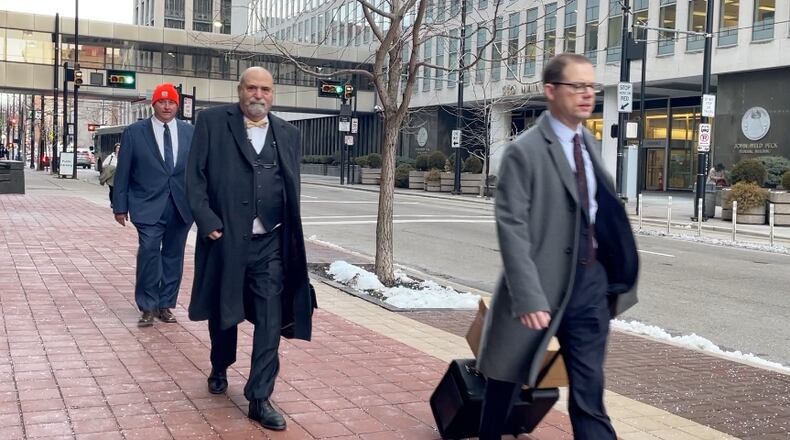Householder is charged with racketeering in what prosecutors have said is likely the biggest bribery and money laundering case in Ohio history. He is accused of using $61 million from Akron-based FirstEnergy to make Householder speaker in 2019 and then pass the bailout, which primarily benefited FirstEnergy.
In earlier testimony, FBI Special Agent Blane Wetzel and other witnesses testified that in 2016, Householder, a Republican from Glenford, decided to run for a seat that he occupied in the early 2000, work to elect sympathetic Republicans and regain the speaker’s gavel in 2019. Around the same time, FirstEnergy was hemorrhaging money through its nuclear and coal plants and started the process that would put the subsidiary that owned them into bankruptcy.
Householder is accused of taking the huge amount from FirstEnergy to achieve his political goals in return for passing and protecting the bailout — House Bill 6 — part of which went to subsidize 70-year-old coal plants despite the legislation’s “Clean Air” moniker.
Prosecutors have displayed communications showing that FirstEnergy executives wanted the subsidies to make the nuclear and coal plants more attractive to buyers.
After about nine days of testimony, Assistant U.S. Attorney Emily Glatfelter asked Wetzel about sums Householder personally received from accounts funded by a 501(c)(4) dark money group that was financed by FirstEnergy. According to Wetzel, money went for expenses ranging from paying off Householder’s credit card bills to cleaning the pool at a home he owned in Florida.
The money, more than $500,000, went to Householder through accounts controlled by political operative Jeff Longstreth, according to bank records Glatfelter displayed on Wednesday. In opening statements last month, Householder’s attorneys said that the payments were loans from Longstreth, who was also charged in the case, but he pleaded guilty and is now cooperating with the prosecution.
Among the payments benefitting Householder were transfers in early 2020 paying off more than $20,000 in credit card debt. That was about four months after the failure of an attempt to put a repeal of the utility bailout on the ballot.
On Tuesday, Wetzel described how FirstEnergy plowed tens of millions into fighting the repeal effort in coordination with Householder and his aides. Wetzel also said that by early 2020, Householder was plotting to use still more FirstEnergy money to again elect friendly lawmakers in the primary and general elections that year so Householder could retain his speakership the following January.
In early 2020, the speaker was also pushing FirstEnergy executives to support legislation that would limit lifetime service in the House and Senate to 16 years, according to text messages displayed on Tuesday.
Prosecutors showed other bank statements indicating that between April and June 2019 — as HB 6 was being introduced and passed through the House — Longstreth was paying property taxes and for pool cleaning on a house Householder owned in Naples, Fla.
According to communications shown in court, Longstreth was acting as a sort of property manager — getting the pool cleaned, the air conditioner fixed, and getting estimates of what the house would rent or sell for and how much it would cost to bring it up to snuff. In all, Longstreth paid $158,000 for maintenance, taxes, and upgrades, Wetzel said.
But while the estimate Longstreth received said a repaired house would sell for just over $300,000, Glatfelter introduced a deed transfer showing that Householder sold it for $690,000 on April 29, 2022. She didn’t introduce any evidence that might explain the discrepancy.
And then there was the coal mine in Alabama.
Householder was president of an investment group that bought the mine and “he made good money” from the investment, one of his attorneys, Steven Bradley, said in opening statements. But as the fracking boom took hold, natural gas became much cheaper over the past decade and coal mining became a bad investment — much as what happened with FirstEnergy’s coal and nuclear plants.
Between May and November of 2018, as Householder was trying to get his slate elected to the House, Longstreth paid out $300,300 to settle lawsuits arising from the coal mine investment. The following year when he was again speaker, Householder would champion the “Ohio Clean Air Program.”
Glatfelter finished her lengthy questioning of the FBI’s Wetzel on Thursday.
On cross examination, Householder’s attorneys presented evidence to show that other entities contributed to a dark money group primarily funded by FirstEnergy and that FirstEnergy wasn’t only supporting Householder. The goal appears to be to show that he wasn’t involved in racketeering, but the normal political process instead.
Testimony is expected to resume at 9:30 a.m. Friday.
About the Author
